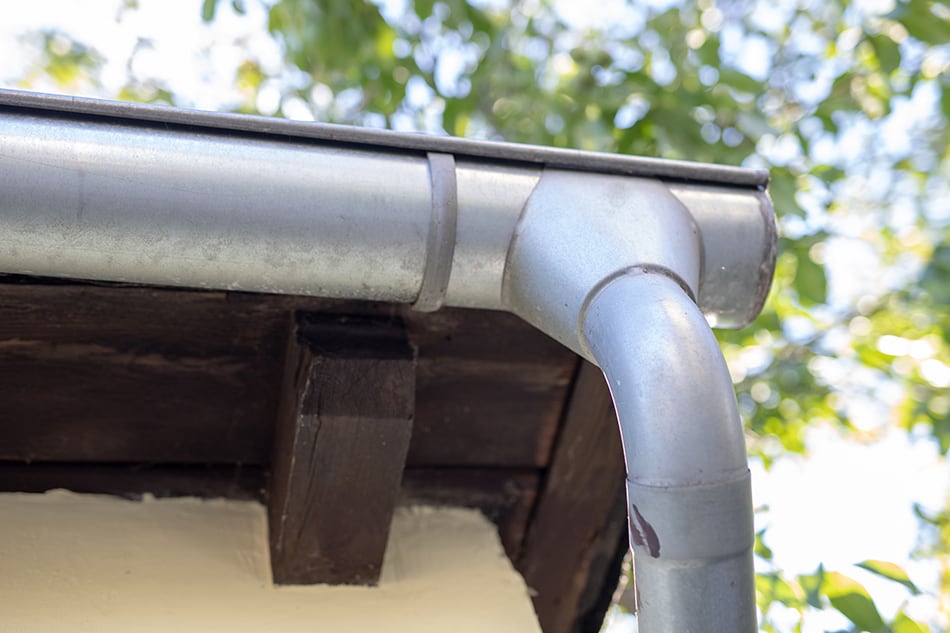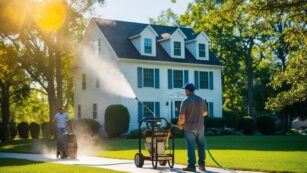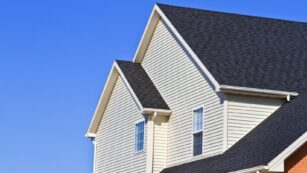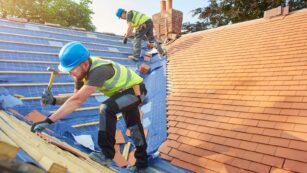Eavestroughs play an important role in protecting the foundation of your house against rainwater damage. Without them, melting snow and rainwater cause soil erosion and even damage to roofs and windows. It is therefore important to choose gutters of the best quality.
Although eavestroughs can be found in all kinds of materials, some are better than others. The two most common gutter materials are aluminium and PVC or vinyl. Each of them has its pros and cons, although there are some similarities. At the same time, both have different strengths and weaknesses that you need to be aware of before choosing the right material for your home.
To help you make an informed decision, let’s examine aluminium eavestroughs vs. vinyl eavestroughs and compare the two materials to see which one is most suitable for your home.
What is an aluminium gutter?
Aluminium gutters are known for their high resistance and durability in adverse weather conditions. High-quality aluminium eavestroughs, over 0.25 inches thick, are resistant to rust and can last for decades. These gutters come in different styles, shapes and sizes, and you can even paint them in any colour you want. But like everything else, this equipment has its strengths and weaknesses.
Knowing the pros and cons of aluminium eavestroughs can help you decide whether they are suitable for your home or not.
for
- The material does not wear out in harsh weather conditions.
- Just like vinyl, aluminium is resistant to rust and decay.
- Available in more than 20 different colours, so you can easily find the best colour combination for your home.
- Aluminium eavestroughs are suitable for almost all climates.
- Unlike vinyl, which can crack or bend, aluminium does not bend so easily.
- Light, but heavier than vinyl.
Other
- Aluminium can be dented by heavy snow or hail.
- Not suitable for self-installation
- Rapid temperature changes can cause the gutter to expand and contract, which can cause the material to crack or break.
- Coated enamel, which protects against rust, can peel off every year, making it necessary to paint to maintain the original appearance of the eavestroughs.
- Aluminium can be noisy when rainwater is drained through the eavestroughs.
What is a PVC or vinyl gutter?
Vinyl gutters are made of PVC, a durable plastic. These very affordable eavestroughs are super easy to install and lighter than any other eavestrough material. Even if you’re not a handyman, you can easily install them yourself without tools. All you need is a ladder!
The simple snap-on installation technique of these gutters is what makes them so popular in the renovation market. And because vinyl lead-throughs are made of plastic, they are highly resistant to corrosion and scratches. Moreover, these gutters are not available in different colours, so you don’t make the wrong choice.
for
- Vinyl is the easiest material to install. This is largely due to its flexibility and light weight, making it a popular choice for do-it-yourself projects.
- Vinyl eavestroughs are the cheapest material on the market. But the initial savings are somewhat weakened by their short lifespan.
- If you divert rainwater, you can barely hear it through your vinyl eavestroughs.
- Most suitable for mild climates
- Vinyl eavestroughs require virtually no maintenance and if one of the parts fails, you can easily replace it yourself.
Other
- Due to their relatively short lifespan, vinyl grommets cannot withstand severe weather conditions.
- These eavestroughs can break or crack in case of heavy snowfall or direct sunlight.
- A few inferior vinyl passages in the last ten years alone….
- Sag
Use for Aluminium and Vinyl Gutters
People with a tight budget find vinyl to be the most affordable option all the time. Because vinyl is made of PVC plastic, it does not rust or corrode. However, before choosing this eavestrough material, make sure that the area where you live is suitable for vinyl. This gutter material is not resistant to severe weather conditions because it can deform under extreme heat and cold.
The poor quality of the vinyl throughput tends to weaken quickly and is more inclined to sag under heavy snow or even under the stairs.
If you prefer vinyl throughput, be sure to choose the thickest plastic because it will break less easily in extremely cold weather. These gutters are still easy to install and cannot be dented as easily as their thin plastic counterparts.
The aluminium passages, on the other hand, are a better option if you live in a harsh climate. These eavestroughs do not sag over time because they can withstand heavy hailstorms and snow.
Like vinyl, aluminium eavestroughs are easy to install, and because they are made of aluminium metal, they are not as heavy as stainless steel. Moreover, their appearance matches both traditional and modern homes.
Another advantage of aluminium eavestroughs over vinyl eavestroughs is their resistance to cracking. They have a polyester powder coating that makes them stainless.
Now that you have a better idea of the different applications of these eavestroughs, it is time to compare the two eavestroughs. Read the following to find out which eavestrough material is most suitable for your situation.
Aluminium and Vinyl Goths, Detailed equation
Easy installation
As you already know, PVC eavestroughs are extremely easy to install. Attach the individual parts to each other and secure them with staples. But did you know that it is actually easier to install aluminium eavestroughs than vinyl eavestroughs? That’s because vinyl passages are not continuous, so installing each section takes time, even for the most enthusiastic DIY enthusiast. This is why most people prefer to hire professionals to do the installation.
Aluminium eavestroughs are as light as PVC, but much easier to install because they have fewer seams. Some are even completely transparent. Even if you don’t want to install these gutters yourself, you can easily find someone to take over the project.
Sustainability
When comparing the performance of the two drains, their resistance must be taken into account. Aluminium eavestroughs are much more durable because they do not rust or bend.
Vinyl eavestroughs, although resistant to corrosion, have a low durability because the plastic can crack or become brittle.
Because aluminium eavestroughs can withstand all weather conditions, they are a better choice than vinyl – unless you live in a mild or dry climate. In terms of durability, aluminium beats vinyl again.
Material cost differential
It is certainly useful for homeowners to keep an eye on cost-effective eavestrough materials. While vinyl and aluminium are both affordable compared to stainless steel or copper, vinyl tends to wear out faster, so you’ll pay more for vinyl in the long run.
For a slightly higher price, however, aluminium offers better performance. This is due to the low weight of the channel and the reduced number of connections.
Colour variants
If you want to choose a certain colour or design, you should choose aluminium gutters. These gutters are available in more than 20 models and colours.
Vinyl gutters, on the other hand, are only available in brown and white. You have no other choice of color. If you choose a brown color, it will fade over time, especially if exposed to direct sunlight. If you choose white, it can rust more easily, which is why choosing aluminum eavestroughs is a viable option.
Choose aluminium or vinyl ?
– What’s most popular? Aluminium gutters have long been popular with DIY enthusiasts. These durable eavestrough materials help maintain the value of your home, making them the best option for homeowners.
– Look for a flawless design: Unlike vinyl eavestroughs, which consist of multiple pieces, aluminium eavestroughs are seamless. Their seamless design prevents leaks and makes them more attractive on the outside.
– What is the lifespan of the equipment? Aluminium eavestroughs have a longer lifespan, making them the best choice. The estimated lifespan of these eavestroughs is 20 to 50 years, provided that they are kept in good condition by painting them every two or three years and applying an anti-corrosion coating. Aluminium eavestroughs also retain water better than vinyl eavestroughs. The average lifespan of vinyl eavestroughs is only 10 to 20 years. These eavestroughs need to be replaced every time they break down during heavy rainfall, so the unmistakable winner is the aluminium eavestrough.
Completion
If you want a long life and don’t want all the hassle of vinyl eavestrough maintenance, then you should opt for aluminium eavestroughs. Don’t forget that if you live in a mild climate, vinyl eavestroughs are the ideal choice and can last up to 20 years. And the last decisive factor is your budget. Eventually you will have to spend more money on repairing and replacing vinyl eavestroughs in the long run.
By considering all the comparisons made here, you will be able to form a precise picture of which eavestrough material is most suitable for your home, depending on its performance and your wishes.
Post views :
18
Related Tags:
bathroom tile flooring,kitchen tile flooring,tile places near me
















